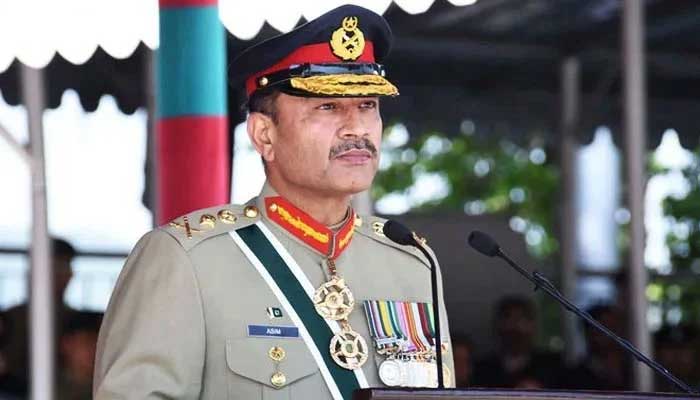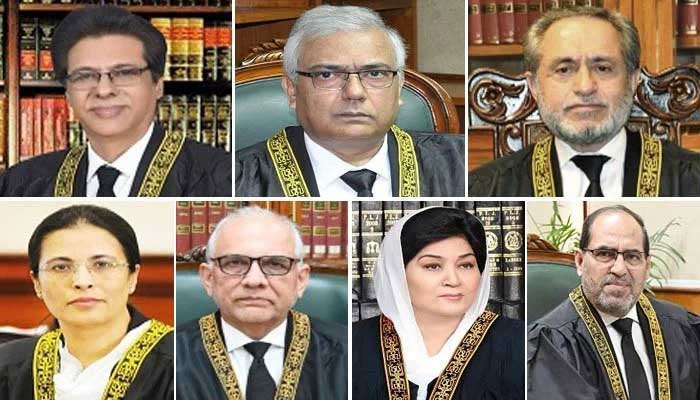

World
politics
Trump considering Surgeon Martin Makary as FDA chief
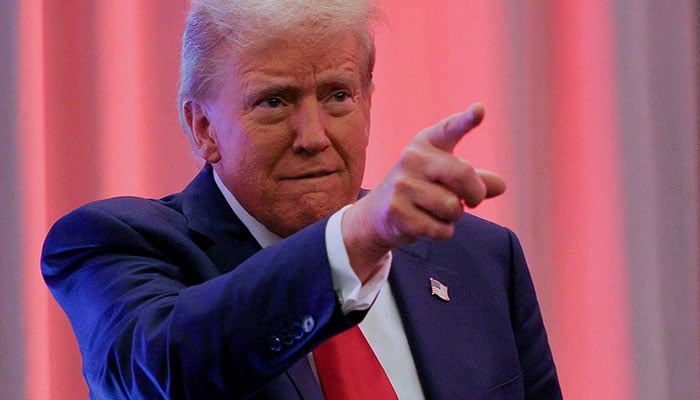
WASHINGTON: US President-elect Donald Trump is reportedly considering Martin Makary, a Johns Hopkins surgeon and vocal critic of COVID-19 mandates, to lead the Food and Drug Administration, two sources familiar with the discussions revealed to Reuters on Wednesday.
Makary raised concerns about a number of public health issues during the COVID-19 pandemic, touting the protection from natural immunity and opposing COVID vaccine mandates.
The FDA is the world’s most influential drug regulator with a more than $7 billion budget. It is responsible for approving new treatments and assuring they are safe and effective before entering the biggest and most lucrative market. It has regulatory authority over human and veterinary drugs, biological medicines, medical devices and vaccines.
The agency is also responsible for maintaining safety standards for the food supply, tobacco, cosmetics, and products that emit radiation.
Brian Hughes, a spokesperson for the Trump transition team, said he would not speculate on or get ahead of any announcement.
As FDA commissioner, Makary would report to the head of the Department of Health and Human Services.
To lead HHS, Trump has nominated Robert F. Kennedy Jr., an environmental activist who has spread misinformation about the safety of vaccines and one of several unconventional Trump picks for top administration jobs.
As a doctor, Makary was a co-developer of the Surgery Checklist, a routine for surgeons that improved patient outcomes and has been spread around the globe by the World Health Organization.
His most recent book, “Blind Spots”, was published in September. In interviews promoting the book, he spoke against what he called “massive overtreatment” in the US that he called “an epidemic of inappropriate care.”
He has advocated for reexamining the use of hormone replacement treatment in menopausal women, reducing overuse of antibiotics and reforms to medical education.
Makary, who lives in Baltimore, has served as an adviser to Washington conservative healthcare think tank Paragon Health Institute.
If confirmed by the Senate, he would succeed Dr. Robert Califf, a cardiologist and researcher who also held the role of FDA commissioner in the Obama administration.
In his second term, Califf revamped the agency’s food operations and inspections processes and tried to combat misinformation.
Indian magnate Gautam Adani charged in US over massive bribery scheme
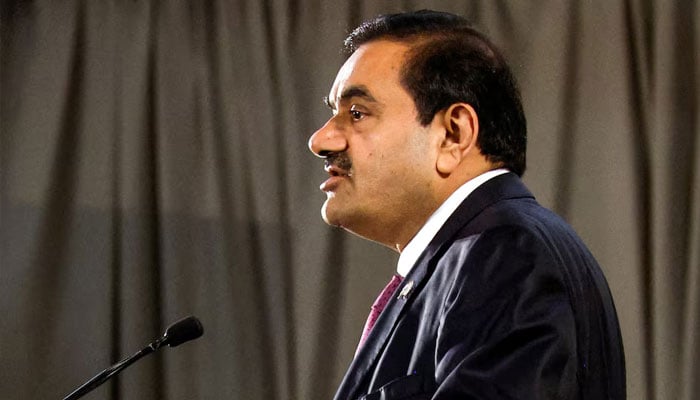
Adani, a close associate of Hindu nationalist Prime Minister Narendra Modi, is alleged to have agreed to pay more than $250 million in bribes to Indian officials for lucrative solar energy supply contracts.
The deals were projected to generate more than $2 billion in profits after tax, over roughly 20 years.
None of the multiple defendants in the case, including Adani, are in custody, the prosecutor’s office told AFP.
Prosecutors say one of Adani’s alleged accomplices meticulously tracked bribe payments, using his phone to log the bungs offered to officials.
“This indictment alleges schemes to pay over $250 million in bribes to Indian government officials, to lie to investors and banks to raise billions of dollars, and to obstruct justice,” said Deputy Assistant Attorney General Lisa Miller.
Fear of reprisal
“Gautam Adani and seven other business executives allegedly bribed the Indian government to finance lucrative contracts designed to benefit their businesses… while still other defendants allegedly attempted to conceal the bribery conspiracy by obstructing the government´s investigation,” said the FBI’s James Dennehy.
A self-described introvert, Adani keeps a low profile and rarely speaks to the media, often sending lieutenants to front corporate events.
Adani was born in Ahmedabad, Gujarat state, to a middle-class family but dropped out of school at 16 and moved to financial capital Mumbai to find work in the city’s lucrative gem trade.
After a short stint in his brother’s plastics business, he launched the flagship family conglomerate that bears his name in 1988 by branching out into the export trade.
His big break came seven years later with a contract to build and operate a commercial shipping port in Gujarat.
Adani Group’s rapid expansion into capital-intensive businesses previously raised alarms, with Fitch subsidiary and market researcher CreditSights warning in 2022 it was “deeply over-leveraged.”
In 2023 a bombshell report from US investment firm Hindenburg Research claimed the conglomerate had engaged in a “brazen stock manipulation and accounting fraud scheme over the course of decades.”
Hindenburg said a pattern of “government leniency towards the group” stretching back decades had left investors, journalists, citizens and politicians unwilling to challenge its conduct “for fear of reprisal.”
Ukraine fires UK Storm Shadow missiles into Russia: media

The report, quoting Russian channels, said 12 of the missiles were fired into Kursk, a border region partially held by Ukrainian forces, on Wednesday afternoon.
The Guardian said the UK had permitted Ukraine to use the missiles in Russia in response to the deployment of North Korean troops on the border.
Broadcasters Sky News and the BBC also reported the use of the missiles.
Both Prime Minister Keir Starmer’s Downing Street office and the Ministry of Defence refused to confirm the reports when contacted by AFP.
Asked about the reports in parliament on Wednesday, Defence Secretary John Healey said he was “unable to go into any further operational details”.
But he said he spoke to his counterpart in Kyiv, Rustem Umerov, on Tuesday, discussing UK support for Ukraine.
“We’ve seen over recent weeks significant change in the action and the rhetoric on Ukraine, and Ukraine´s action on the battlefield speaks for itself,” he said.
“We, as a nation and as a government, are doubling down on our support for Ukraine and are determined to do more.”
On Tuesday at the G20 summit in Rio de Janeiro, Starmer promised that Ukraine would have “what is needed for as long as it’s needed” to defeat Russia.
Several Western countries, including the UK, United States and France, have supplied Ukraine with long-range missiles. Washington gave its approval for Kyiv to use them against targets inside Russia last weekend.
Overnight Monday to Tuesday, US-supplied ATACMS was used against a military site in the Russian border region of Brianksk, prompting the Kremlin to accuse US President Joe Biden of seeking to “escalate” the conflict.
Russian President Vladimir Putin has since signed a decree loosening the rules about the use of nuclear weapons.
Storm Shadows are long-range cruise missiles developed jointly by the UK and France, where they are called SCALP. They are launched from fighter jets and have a range of more than 250 kilometres (155 miles).
The UK-supplied weapons have previously been used against targets in Russian-annexed Crimea.
Putin issues warning to United States with new nuclear doctrine
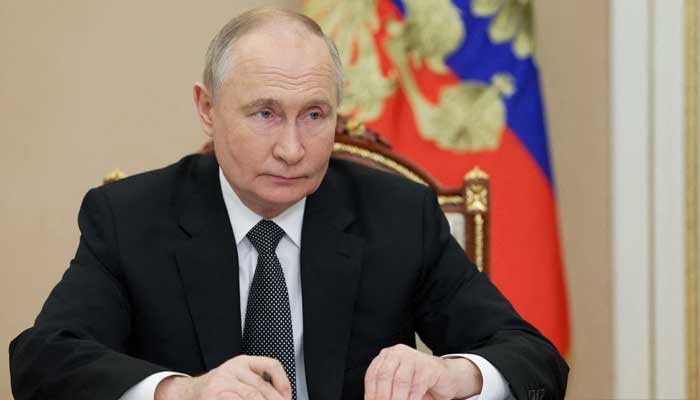
MOSCOW: Russian President Vladimir Putin on Tuesday lowered the threshold for a nuclear strike in response to a broader range of conventional attacks, and Moscow said Ukraine had struck deep inside Russia with US-made ATACMS missiles.
Putin approved the change days after two US officials and a source familiar with the decision said on Sunday that US President Joe Biden’s administration allowed Ukraine to use US-made weapons to strike deep into Russia.
Russia had been warning the West for months that if Washington allowed Ukraine to fire US, British and French missiles deep into Russia, Moscow would consider those NATO members to be directly involved in the war in Ukraine.
The updated Russian nuclear doctrine, establishing a framework for conditions under which Putin could order a strike from the world’s biggest nuclear arsenal, was approved by him on Tuesday, according to a published decree.
Analysts said the biggest change was that Russia could consider a nuclear strike in response to a conventional attack on Russia or its ally Belarus that “created a critical threat to their sovereignty and (or) their territorial integrity”.
“The big picture is that Russia is lowering the threshold for a nuclear strike in response to a possible conventional attack,” said Alexander Graef, a senior researcher at the Institute for Peace Research and Security Policy at the University of Hamburg.
The previous doctrine, contained in a 2020 decree, said Russia may use nuclear weapons in case of a nuclear attack by an enemy or a conventional attack that threatened the existence of the state.
Lower threshold
The doctrine said any attack by a non-nuclear power supported by a nuclear power would be considered a joint attack, and that any attack by one member of a military bloc would be considered an attack by the entire alliance, it said.
Russia’s defence ministry said Ukraine had struck Russia’s Bryansk region with six missiles, and that air defence systems intercepted five and damaged one.
On the 1,000th day of the Ukraine war, Russia also included a broader definition of the data that could be used to indicate Russia was under mass attack from aircraft, cruise missiles and unpiloted aircraft.
The war is entering what some Russian and Western officials say could be its final and most dangerous phase as Moscow’s forces advance at their fastest pace since the early weeks of the conflict and the West ponders how the war will end.
Together, Russia and the US control 88% of the world’s nuclear warheads. Putin is the primary decision-maker on the use of Russia’s nuclear arsenal.
Safe-haven assets such as government bonds, the Japanese yen and gold bounced sharply after the publication of Russia’s updated doctrine.
War
Russian diplomats say the crisis is comparable to the 1962 Cuban Missile Crisis when the two Cold War superpowers came closest to intentional nuclear war, and that the West is making a mistake if it thinks Russia will back down over Ukraine.
The Kremlin said Russia considered nuclear weapons a means of deterrence and that the updated text was intended to make clear to potential enemies the inevitability of retaliation should they attack Russia.
“Now the danger of a direct armed clash between nuclear powers cannot be underestimated, what is happening has no analogues in the past, we are moving through unexplored military and political territory,” said Sergei Ryabkov, Russia’s deputy foreign minister overseeing arms control and US relations.
The main changes to the nuclear doctrine were flagged by Putin in September.
Asked whether publication of the decree was linked to Washington’s decision on allowing Ukraine to fire US missiles deep into Russia, Kremlin spokesperson Dmitry Peskov said the doctrine had been published in a “timely manner”.
“Nuclear deterrence is aimed at ensuring that a potential adversary understands the inevitability of retaliation in the event of aggression against the Russian Federation and/or its allies,” Peskov said.
Sheikh Hasina faces arrest warrant as Bangladesh to seek extradition from India
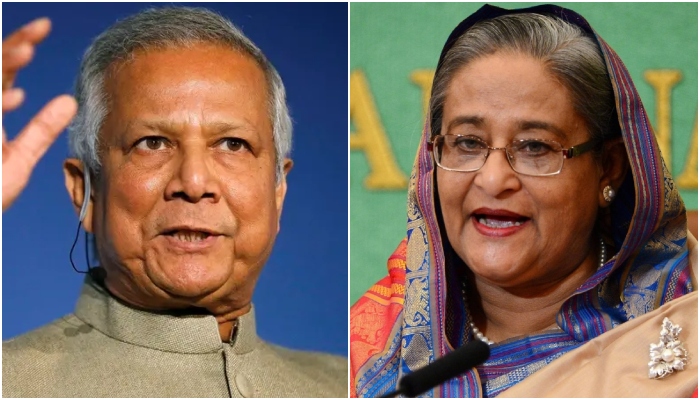
DHAKA: Bangladesh interim leader Muhammad Yunus on Monday said his government would request the extradition of Sheikh Hasina, the former prime minister who fled to India after her government was overthrown in a revolution in August.
Hasina, 77, was last seen landing in neighbouring India after escaping her country by chopper as protestors surrounded her palace.
A court has already issued an arrest warrant for Hasina while she is living in exile in India despite being summoned by a Dhaka court on Monday to face the trial on accusations of “massacres, killings, and crimes against humanity.”
Yunus said his administration was focused on ensuring those guilty of cracking down on the protests to oust Hasina faced justice.
Several of her former government ministers, who were detained and held in custody, are expected in court to face similar charges.
“We have already taken initiatives to try those responsible for enforced disappearances, murders, and the mass killings during the July-August uprising,” Yunus said on Sunday.
The 84-year-old Nobel Peace Prize winner was appointed to lead the government as “chief advisor” on August 9, days after the end of Hasina’s 15 years of iron-fisted rule.
Yunus, in a speech to the nation marking 100 days in power since a student-led revolution, said he had spoken to Karim Khan, chief prosecutor of the International Criminal Court.
“We will seek the extradition of the ousted autocrat from India,” Yunus said, referring to Hasina.
Earlier this month, Bangladesh said it would request an Interpol “red notice” alert for fugitive leaders of Hasina’s regime.
Red notices issued by the global police body alert law enforcement agencies worldwide about fugitives.
India is a member of Interpol, but the red notice does not mean New Delhi must hand Hasina over.
Member countries can “apply their own laws in deciding whether to arrest a person”, according to the group, which organises police cooperation between 196 member countries.
Yunus seeks time for poll
Yunus, a microfinance pioneer, is leading a temporary administration to tackle what he has called the “extremely tough” challenge of restoring democratic institutions in the South Asian nation of around 170 million people.
He also begged the country’s “patience” to prepare for the much-awaited poll, vowing an election commission would be formed “within a few days”.
But Yunus said he could not give a timeframe for the elections, adding it was dependent on a raft of reforms.
“I promise that we will hold the much-anticipated election once the necessary and essential reforms are complete,” he said in the broadcast.
“I request your patience until then. We aim to build an electoral system that will endure for decades. For this, we need some time.”
Crisis Group analyst Thomas Kean has called the challenge facing Yunus “monumental”, warning that “cracks are emerging in the fragile alliance” that pushed him into power.
“For now, Yunus and his colleagues have widespread support, but popular expectations are double-edged,” the thinktank said in a report on Thursday.
“If the interim administration falters in making reforms, the outcome is likely to be an early election with little progress; in the worst-case scenario, the military could assume power.”
Economy (world)

PAKISTAN
Politics
Imran Khan faces new case: Trial to begin at Adiala Jail today
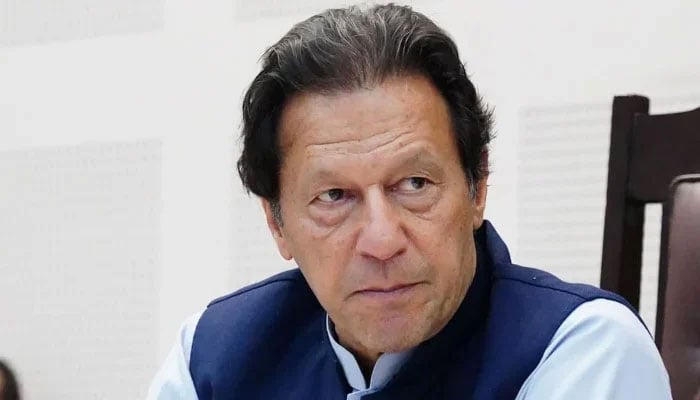
Former Prime Minister and Pakistan Tehreek-e-Insaf (PTI) founder, Imran Khan, has been booked in a new case by Rawalpindi police just hours after he secured bail in the Toshakhana 2.0 case.
The Islamabad High Court (IHC) granted bail to the 71-year-old politician on Wednesday. Justice Miangul Hassan Aurangzeb approved his bail plea against surety bonds worth Rs1 million each.
After the IHC approved his plea, the PTI founder is no longer wanted in any other case within Islamabad’s jurisdiction.
However, late on Wednesday, the Rawalpindi police arrived at the Adiala Jail and formally “arrested” him in connection with a new case filed at the New Town police station.
According to a police spokesperson, the case stems from a PTI protest on September 27 and involves charges of incitement to arson and property damage under Section 7 of the Anti-Terrorism Act (ATA) and relevant sections of the Pakistan Penal Code (PPC).
An anti-terrorism court will now start hearing the case at Adiala Jail today. Police investigators are expected to request Imran’s physical remand during today’s hearing.
The FIR names several PTI leaders, including Khyber Pakhtunkhwa Chief Minister Ali Amin Gandapur and Seemabia Tahir, Amir Mughar and Aliya Hamza, as co-accused.
The FIR levels charges of terrorism, attempted murder, vandalism, destroying public and state property, and interference in government operations, against the accused. It also claims that a petrol bottle was found with a suspect, Tahir, at the protest scene.
The FIR that was lodged on September 28 says that the participants created unrest, obstructed public access by burning tires and caused difficulties for citizens.
The FIR says the PTI leaders and activists raised anti-government slogans, hurled stones at the police and attacked with iron rods during the protest.
Several police vehicles, including that of SP Rawal, were damaged, and one police officer sustained a severe eye injury from glass, said the FIR, adding that the accused seized government firearms and fired them in the air, causing panic.
Imran and his wife, Bushra Bibi, were arrested in the case on July 13, shortly after the former first couple was acquitted by a district and sessions court of Islamabad in the iddat case — also known as the un-Islamic nikah case.
The former first lady was released last month from jail in the Toshakhana 2.0 case after spending around nine months behind bars.
Their case was previously heard by the accountability court of the National Accountability Bureau (NAB). However, it was transferred to the FIA in line with the Supreme Court’s verdict restoring amendments to the anti-corruption laws.
Army chief says protecting ‘digital borders’ responsibility of state
KARACHI: Chief of Army Staff (COAS) General Syed Asim Munir said on Wednesday that the state is also responsible to protect the “digital borders” of the country and “ensure digital security” of the people.
Addressing the business community in Karachi, the army chief expressed optimism about the country’s economic progress, saying that he has a firm belief in Pakistan’s bright and stable future.
Recalling his earlier statement during the previous meeting with the business community, COAS Munir said that he had told everyone that “hopelessness is forbidden”.
He said that the country’s economic indicators turned positive which he said would further improve next year “while those who made claims about the country’s default are nowhere to be seen”. He called for accountability of those elements who spread disappointment amongst the masses
“Nothing, including politics, is superior to our country and we also should prioritise the country over personal gains,” said the army chief, adding that the people should ask about the importance of a state from the people of Libya, Iraq, and Palestine.
He asked the masses to make united efforts to deal with challenges facing the country.
“Only Pakistanis could bring economic stability in Pakistan,” said General Munir urging overseas Pakistanis to bring investments in their home country to play their role in the country’s development and prosperity.
He said that those running illegitimate businesses were backing terrorism with ulterior motives.
Last week, General Munir termed “misleading and incorrect information” a major challenge, he said that without comprehensive laws and regulations it will continue to destabilise “political and social structures”.
He made the statement while addressing a special ceremony of Margalla Dialogue 2024, organised by Islamabad Policy Research Institute (IPRI).
Speaking about global challenges at the ceremony, Gen Munir had said that the world, in recent years, has been facing many challenges, among which the rapid spread of false and misleading information is a major one.
“In view of many changes in the world, the increasing influence of violent non-state actors and state-sponsored terrorism is also a major global challenge.”
Stressing stricter rules for social media, he added that freedom of speech without restrictions was “leading to the degradation of moral values in all societies”.
Lahore schools resume after slight ease in Punjab smog
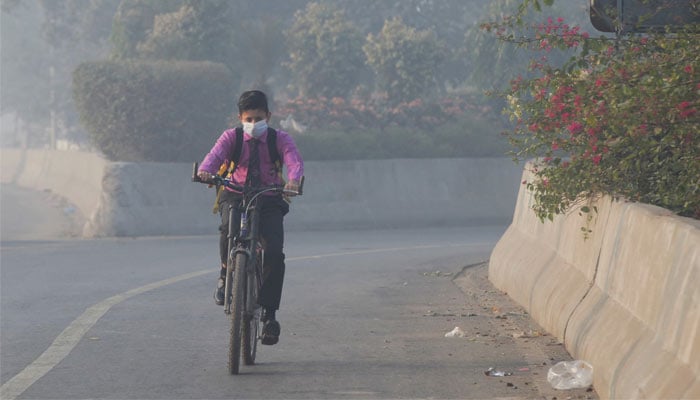
Residents in Punjab capital Lahore again woke under a blanket of choking smog Wednesday, as poor air quality keeps the city on the second spot in the global pollution rankings despite a slight relief.
Schools reopened in Lahore and Multan, the worst smog-hit cities in Pakistan Punjab after a drop in dangerous air pollution.
The authorities had ordered the schools shut nearly two weeks ago in the province, home to nearly half the country’s 240 million population, as dense smog hit “hazardous” levels.
“The ambient air quality has improved in Punjab, due to rain in upper parts of Punjab, change in wind direction and speed,” the province’s environmental agency said late Tuesday.
Students and staff will be required to wear face masks, it added, while also ordering extension of “complete ban on outdoor sports and outdoor co-curricular activities till further orders”.
The air quality index (AQI) was recorded at 455 in Lahore around 9:15 this morning, registering the second-worst air quality in the world while the (PM2.5) pollutants in the air amounted to 296, which is 59.2 times higher than the World Health Organisation’s (WHO) annual air quality guideline value.
Justice Mandokhail questions credibility of data in judiciary’s ranking

ISLAMABAD: Supreme Court’s Justice Jamal Khan Mandokhail has voiced displeasure over the country’s judiciary being ranked poorly by international organisations.
During a constitutional bench hearing on a plea pertaining to litigants’ limited access to the apex court, Justice Mandokhail remarked, “I do not know where these numbers come from. Some rank our judiciary at 120, while others at 150.”
The World Justice Project’s 2024 Rule of Law Index ranks Pakistan at 129 out of 142 countries, reflecting a modest improvement from the previous year.
Justice Mandokhail is part of the constitutional bench — led by Justice Amin-ud-Din Khan — formed under the 26th Constitutional Amendment.
Apart from Justices Khan and Mandokhail, the bench includes five other members — Justice Ayesha Malik, Justice Muhammad Ali Mazhar, Justice Hassan Azhar Rizvi, Justice Naeem Akhtar Afghan, and Justice Musarrat Hilali.
Multiple pleas were heard by the constitutional bench today, which included a lack of petitioners’ access to SC and government employees who were not assigned duties. A petition was also heard against declaring the Sunni Ittehad Council (SIC) as a parliamentary party.
‘Lack of access’
The SC heard a petition regarding the lack of access for litigants to the country’s highest court.
During the proceedings, the petitioner argued that 90% of litigants are unable to approach the Supreme Court, highlighting the challenges faced by the public in seeking justice.
Responding to the claim, Justice Mandokhail remarked that the petitioner’s arguments were being heard directly, questioning what further access was required.
Justice Mandokhail also expressed annoyance, stating that such petitions undermine the institution itself.
Referring to international rankings, he noted that while some claim Pakistan’s judiciary ranks 120th globally and others 150th, it remains unclear where these figures originate.
After deliberation, the constitutional bench ultimately dismissed the petition.
Plea against SIC
Moving on, the seven-member bench heard a petition challenging the declaration of the SIC as a parliamentary party.
The petitioner argued that the petition had been submitted within the prescribed time frame; however, now, a review plea was currently pending.
The petitioner also requested the court to consider this matter in connection with other relevant cases.
In response, Justice Mandokhail questioned the petitioner’s intent, asking why they were seeking an unconstitutional action from the court.
He further noted that candidates have the freedom to join or not join a political party of their choice.
Justice Khan also cautioned the petitioner, Molvi Iqbal, reminding him that he was revisiting the same issues that had previously led to restrictions. After deliberation, the constitutional bench upheld the objections raised by the Registrar’s Office and dismissed the petition.
‘Should we dismiss president?’
The apex court heard a petition concerning the dismissal of government officials who did not do their designated jobs or remained unassigned to any duties. The constitutional bench, after reviewing the petition, declared it inadmissible and dismissed it.
During the proceedings, Justice Ayesha pointed out that the petitioner’s request essentially called for the dismissal of all government employees, suggesting that they do not perform any work.
She advised the petitioner to identify the specific officials in question and approach the relevant authorities for action.
Justice Mazhar noted that the petitioner had failed to mention any specific government officials in their application. Meanwhile, Justice Mandokhail questioned the petitioner about which particular task had not been completed, urging them to clarify.
In a more pointed remark, Justice Mandokhail asked, “What do you mean? Should we dismiss the president, prime minister, speaker, and all members of the assembly?”
The petitioner responded by claiming that the system had collapsed and that no one was willing to listen to the truth. Ultimately, the constitutional bench dismissed the petition, declaring it inadmissible.
Time frame for deciding cases
The Supreme Court also heard a petition seeking the establishment of a time frame for completing trials in courts.
Justice Ayesha, during the proceedings, observed that several laws, including those related to criminal cases, already specify time frames.
She advised the petitioner to approach Parliament for legislation on this matter if further measures were required. The petitioner then argued that trials often take 20 to 40 years to conclude.
In response, Justice Malik cautioned against making sweeping allegations, acknowledging that while the system is not perfect, progress is being made.
She further noted that the petition pertained to national judicial policy and clarified that the court could not issue directives under Article 184(3) of the Constitution.
The top court’s judge asked that the petitioner to engage with ongoing reform efforts rather than seeking the court’s intervention, as this did not fall within its purview.
Justice Mandokhail reiterated that the judiciary operates within the bounds of the Constitution and the law, while Justice Hilali warned that a stringent response from the courts could lead to further disillusionment.
Justice Ayesha also pointed out that the Law and Justice Commission is the appropriate forum for addressing judicial reforms.
Following the arguments, the constitutional bench dismissed the petition, deeming it inadmissible.
Nov 24 protest can be called off if demands met, says Imran Khan’s lawyer

RAWALPINDI: Hinting at the possibility of calling off the November 24 protest, Pakistan Tehreek-e-Insaf (PTI) founder Imran Khan’s lawyer, Faisal Chaudhry, has said that the march would only be abandoned if the party’s demands are met.
Following a meeting with Khan at Adiala jail in Rawalpindi, lawyer Faisal Chaudhry said: “If there’s headway in talks by tomorrow, there’ll be celebrations instead of protests.”
The lawyer went on to say that the PTI founder has said that this was the second time he had given a protest call since the May 9 protest — which saw state installations being ransacked.
Khan also said that there is no option left except for protests, emphasising that political parties are crucial in keeping the country united.
The PTI founder also expressed concerns over restrictions faced by the party, saying, “We are not allowed to hold rallies or gatherings.”
“I have always called for peaceful protests,” he claimed.
The former premier further stated that he had given time for the negotiations until tomorrow.
“Talks will only take place with those who hold the real power,” the deposed prime minister’s lawyer quoted him as saying.
The cricketer-turned-batter, the lawyer said, reiterated that PTI’s demands would form the basis of any dialogue and that the cancellation of protests depends on the acceptance of those demands.
“It takes effort from both sides for progress to be made.”
Moreover, the PTI founder also clarified that reports of spending Rs1 billion on protests were baseless, Chaudhry added.
The lawyer went on to say that the PTI founder has said that this was the second time he had given a protest call since the May 9 protest — which saw state installations being ransacked.
Khan also said that there is no option left except for protests, emphasising that political parties are crucial in keeping the country united.
The PTI founder also expressed concerns over restrictions faced by the party, saying, “We are not allowed to hold rallies or gatherings.”
“I have always called for peaceful protests,” he claimed.
The former premier further stated that he had given time for the negotiations until tomorrow.
“Talks will only take place with those who hold the real power,” the deposed prime minister’s lawyer quoted him as saying.
The cricketer-turned-batter, the lawyer said, reiterated that PTI’s demands would form the basis of any dialogue and that the cancellation of protests depends on the acceptance of those demands.
“It takes effort from both sides for progress to be made.”
Moreover, the PTI founder also clarified that reports of spending Rs1 billion on protests were baseless, Chaudhry added.
The former ruling and now opposition party has announced a “do-or-die” demonstration Islamabad on the call of its founder, who remains incarcerated in Adiala jail. PTI has time and again called for Khan’s release and the return of its mandate which it alleges was stolen in the February 8 polls.
For months, it has been at odds with the incumbent government and has marched onto the federal capital on multiple occasions leading to a crackdown against its leaders and workers.
Punjab government has adopted a strong stance against the rival party’s “final call” protest, saying that it would deal with protesters on November 24 as they do with terrorists.
Security beefed up
With the PTI refusing to back from its protest call, the government too has geared up for the demonstrations with Punjab and Islamabad police seeking additional personnel to maintain the law and order situation.
Over 10,700 police personnel from across Punjab have been put on standby with the force being provided with tear gas, rubber bullets, and anti-riot gear.
Meanwhile, the Islamabad administration has also requisitioned 8,000 additional personnel from Punjab, Sindh, and Kashmir.
Section 144, prohibiting gatherings of more than five people, has been imposed in Islamabad for two months.
The Rangers and the Frontier Corps (FC) are already deployed in the capital which may be sealed off with shipping containers by Friday (November 22).
Bilawal’s foreign trip delays PPP’s CEC huddle
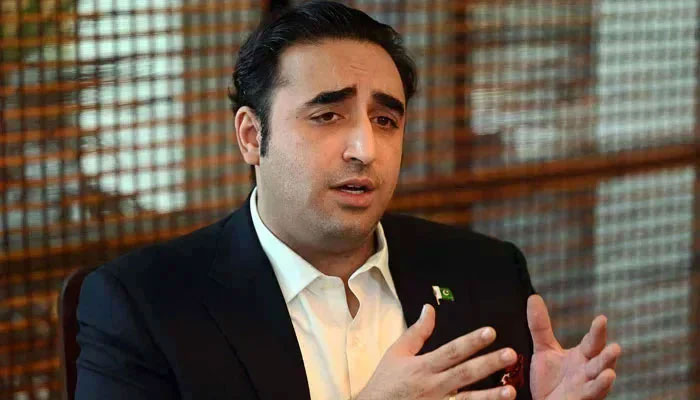
The Pakistan Peoples Party (PPP) Chairman Bilawal Bhutto-Zardari has left for Dubai, the party sources said on Thursday, adding that the Central Executive Committee (CEC) meeting, which was initially scheduled for this month has been postponed.
According to insiders, the 36-year-old PPP chief is expected to embark on a Europe tour from Dubai.
PPP will hold its CEC meeting after Bilawal returns home, say sources
The Pakistan Peoples Party (PPP) Chairman Bilawal Bhutto-Zardari has left for Dubai, the party sources said on Thursday, adding that the Central Executive Committee (CEC) meeting, which was initially scheduled for this month has been postponed.
According to insiders, the 36-year-old PPP chief is expected to embark on a Europe tour from Dubai.
The CEC meeting will now be convened after his return to Pakistan. The crucial PPP huddle was anticipated to discuss critical decisions, including the party’s alliance with the ruling Pakistan Muslim League-Nawaz (PML-N).
The PPP had recently set up a negotiation committee to resolve its differences with the federal government. The negotiating team includes senior leaders Raja Pervaiz Ashraf, Naveed Qamar, Sherry Rehman, and Sindh Chief Minister Murad Ali Shah.
Balochistan Chief Minister Sarfaraz Bugti and Punjab Governor Sardar Saleem Haider are also part of the committee, which is tasked with presenting its findings to the CEC next month.
Earlier this month, Bilawal publicly voiced his disappointment with the federal government. Speaking at the PPP media cell in Karachi on November 14, he alleged that Sindh was being unfairly treated.
“The Centre offers neither respect nor political cooperation, and agreements are being ignored,” he remarked.
He specifically criticised the construction of new canals from the Indus River, describing it as a violation of agreements between the PPP and PML-N.
“I was busy with the 26th Amendment and the government approved the canals behind my back,” he had said.
Reacting to the PPP chief’s concerns, Prime Minister Shehbaz Sharif directed Deputy Prime Minister and Foreign Minister Ishaq Dar to reach out to Bilawal to address his grievances.
Barrister Aqeel Malik, the government spokesperson on legal affairs said that Dar would soon meet Bilawal to resolve the issues between the coalition partners.


